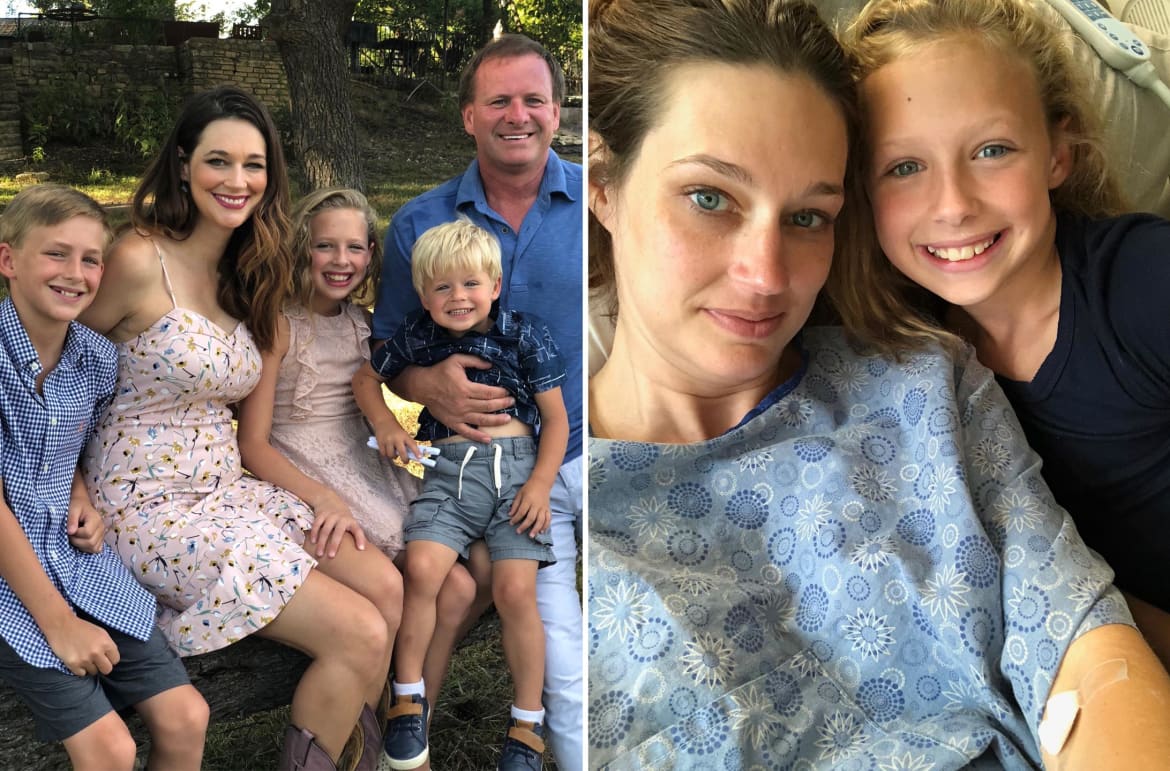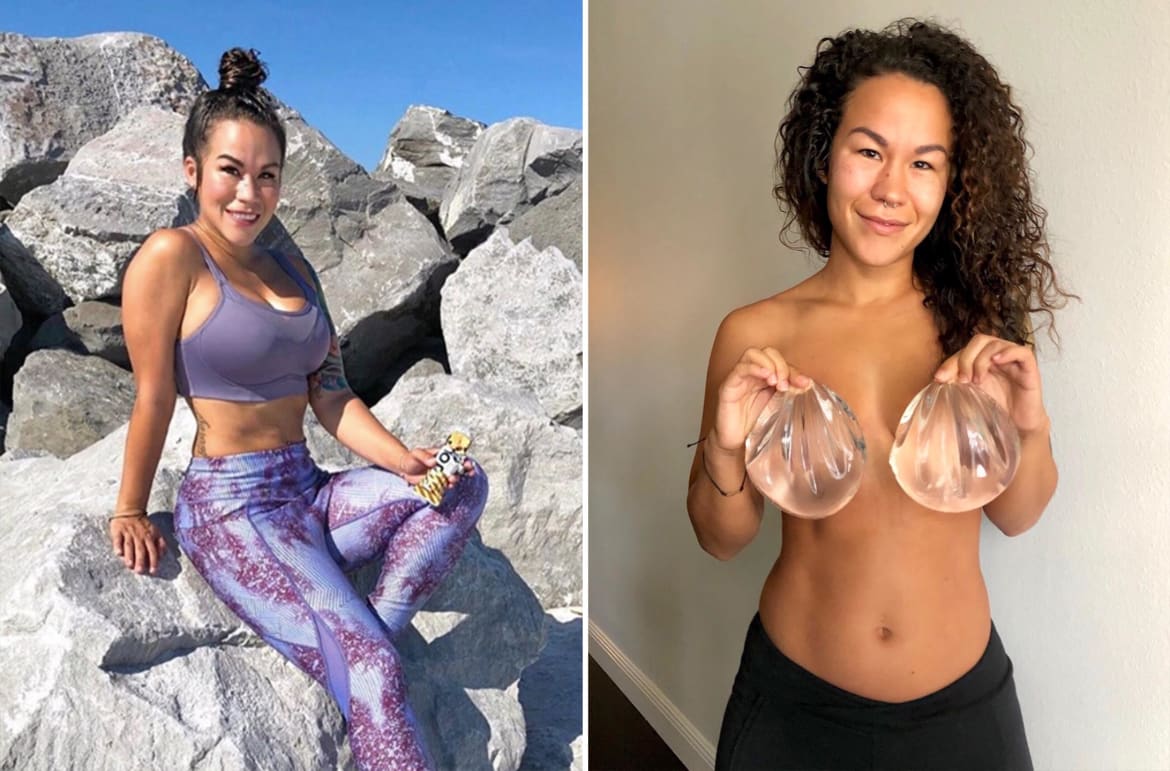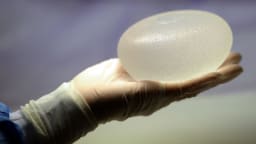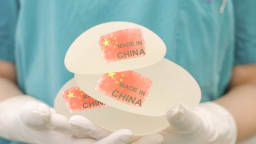They think their implants are destroying their health and are frustrated that many doctors don’t agree.
Denise Milisitz has been diagnosed with pneumonia seven times in the last two years. In between bouts, she suffers from a persistent, chest-rattling cough that leaves her winded and exhausted. She’s been hospitalized five times, for at least three days, to get IV antibiotics that make her veins harder to find each time. At the age of 41, her doctor has suggested she be tested for cystic fibrosis, a genetic disease that usually presents itself before age 2.
Milisitz never thought her ailments could be caused by the two saline bags implanted in her chest—until last month.

Courtesy Denise Milisitz
That’s when she joined Breast Implant Illness and Healing by Nicole, a Facebook group for women who believe their various health problems are caused by their breast implants. The group is one of dozens that women have flocked to in recent years, complaining of symptoms from depression to autoimmune illness. They refer to their complaints, which range from minor nuisances to debilitating diseases, as “Breast Implant Illness.”
Whether breast implants can actually cause illness is far from certain. The subject has been studied frequently, though perhaps not thoroughly, and advocates on both sides point to flaws in the research supporting either conclusion. Regardless, thousands of women in these groups say they started feeling sick when their implants were put in, and only stopped once they were gone.
The Facebook groups act as a virtual support network for these women, many of whom feel ignored and mistreated by the medical community. The women validate each others’ complaints, share suggestions, and reassure themselves that there is life after implants. Many women post updates from their explants, an increasingly popular surgery to remove the devices for good.
-
BOOBY TRAP
This Breast Implant Could Cause a Rare Lymphoma
The administrators of these groups say their purpose is to share experiences, not to offer medical advice. But some doctors are worried about the remedies being promoted, from restrictive “detox” diets to activated charcoal and antifungals—treatments they say can be expensive and pointless, or possibly harmful.
Milisitz, a university fundraiser from Virginia Beach, said she joined a group out of a mix of curiosity and desperation. Within weeks of reading others’ posts, she was convinced she needed to get her 17-year-old implants out of her body. She spoke to The Daily Beast from bed days after her explant surgery.
“After reading these symptoms, I just was like, ‘I have to check everything off the list or I’m gonna die,’” she said.That breast implants can cause health problems is not up for debate. The FDA lists 26 potential complications, from rupture and deflation to infection and necrosis, and warns that up to 20 percent of women will have their implants removed within 10 years. In fact, a recent change to FDA reporting requirements showed complications had actually been underreported for years. In 2016, the year the rules changed, the number of complaints went from 353 to 4,651. More than 8,000 complaints have been filed in the first six months of 2018 alone.
Whether breast implants can cause broader health issues is more contentious. In 1999, a wide-reaching review of studies found no evidence for a novel breast implant syndrome. It also found no evidence for an increase in tissue diseases, cancer, or neurological diseases in implant recipients. A meta-analysis published in The New England Journal of Medicine in 2000 had similar findings. Approving the devices for market in 2006, the FDA said that company-sponsored studies and long-term use showed approval was in “the best interest of American women.”
Nicholas Vedder, president of the American Association of Plastic Surgeons, called the idea of breast implant illness “pure bogus.”
“In my opinion there is no such thing as ‘breast implant associated illness,’” he told The Daily Beast. “It has been studied extensively over the past few decades and has been completely debunked.”
Other experts find this research lacking. Diana Zuckerman, president of the National Center for Health Research, said previous studies failed to track enough implant recipients over a long enough period of time. (Two long-term, FDA-mandated studies were scrapped when the vast majority of patients dropped out in the first year.) Other studies focused on measures like hospitalization rates, Zuckerman said, even though most women with implant-related symptoms are never hospitalized.
“Saying that there’s no evidence sometimes means there’s no evidence yet,” Zuckerman said. “If you keep studying it and studying it appropriately, maybe you’ll find that evidence. And that seems to be what’s happening with breast implants.”
Just this year, the largest study yet on the effects of breast implants found that silicone implants were associated with some rare diseases, autoimmune disorders and other conditions. The study from the University of Texas reported a two- to eight-times higher frequency of Sjogren syndrome, rheumatoid arthritis, scleroderma and melanoma in women with implants over the general population. A recently released Israeli study found higher rates of autoimmune disease in women with implants than those without.
The FDA and other researchers criticized the University of Texas study’s conclusions, citing inconsistencies in the data and potential sources of bias. Bowing to public pressure, however, the agency agreed to hold a public meeting on the safety and effectiveness of breast implants next year.
“The FDA remains committed to thoughtful, scientific, transparent, public dialogue concerning breast implant safety and effectiveness,” Dr. Binita Ashar, the agency’s director of the Division of Surgical Devices, said in a statementannouncing the meeting. “We respect the work of those in the research community to add to the thoughtful discussion on this topic.”
The statement didn’t do much for patients like Milisitz. The 41-year-old mother of three says her health has been in decline since 2001—the same year she took her breasts from an A cup to a C.
A California resident at the time, Milisitz went to a well-known plastic surgeon in San Diego for her augmentation. She loved the look of the implants, a rubbery silicone shell filled with salt water. But four months later, she began experiencing head tremors every time she tried to focus. A neurologist told her the tremor was benign and not to worry.
In 2014, after moving back to Virginia, Milisitz developed a nasty case of bronchitis that wouldn’t subside. The coughing was ceaseless, she said, and made a wet, hacking sound. She saw otolaryngologists, gastroenterologists, infectious medicine doctors, allergists, and three different pulmonologists in hopes of finding a cure. She’d just settled on her current pulmonologist when she came down with her first bout of pneumonia.
Milisitz has been in and out of the hospital almost constantly since that day in December 2016. She’s been tested for bronchiectasis, cystic fibrosis, and general autoimmune disorder. She can easily rattle off the dates and durations of her hospital stays, as well as the toll its taken on her life: missed family vacations, holidays spent in bed, weeks taken off work. She recently shelled out $15,000 for a medical vest in hopes of clearing her airways.
Last month, Milisitz told her husband she didn’t see the point in living. Sitting in bed day after day was getting to her, she said, and she was beginning to feel worthless. Days later, a friend sent her an article on breast implant illness. Her research led her to Breast Implant Illness and Healing by Nicole—a group she said would change the course of her life.
“I felt validated,” Milisitz said of the posts from other women in the group.
“The symptoms I had experienced, I saw them written down, and it wasn’t in my head and I wasn’t making it up,” she added. “To see other women who have experienced what I have experienced, and hearing their stories, it’s helped me realize I’m not crazy.”
At nearly 60,000 members, Breast Implant Illness and Healing by Nicole is by far the largest group of its kind—so big, in fact, that it is now officially recognized as a nonprofit. It’s spawned dozens of copycats, each with memberships in the hundreds or thousands. A rough estimate indicates there are up to 100,000 women in online anti-breast-implant communities across the globe.
That wasn’t the case for the group’s founder, Nicole Daruda, when she had her own explant years ago. Bedridden by ailments like thyroid and kidney dysfunction, Daruda diagnosed herself with breast implant illness using the only resource she could find: a small website run by an 80-year-old woman. She had her implants removed shortly after.
In 2013, Daruda set to work making her own website. She wrote down all the information she would have wanted during her illness, including the exact ingredients of breast implants and the healing methods that worked for her. Within two years, the site was attracting so many views—and so many comments—that she decided to start a Facebook forum. The group exploded from there.
“It’s just growing exponentially,” Daruda told The Daily Beast this week. “Right now there’s over 200 women coming every day.”
Daruda has encouraged women to start regional groups of their own. Other, smaller groups have sprung up organically. Within the safety of their closed walls, thousands of women complain about their symptoms, share their successes, and vent about not being heard. (“My husband thinks I’m crazy,” is a common refrain.)
Some women post photos from their sick beds, while others share smiling photos post-explant. A popular post is the reverse “before and after,” where women show how much healthier they look after getting their implants removed.
“My old boobs were great but they were robbing me,” one recent post read. “My new/old boobs are small, misshapen, and wrinkled but they are mine!”
-
UNREGULATED
Dr. Hid ‘Made in China’ Breast Implants
Laura Borg, 30, told The Daily Beast she still posts in the group regularly despite getting her implants removed two years ago. Borg was diagnosed with an autoimmune disorder shortly after getting her implants in 2012, and says her symptoms have markedly improved since the explant. She often posts photos of her AA chest in the group to show women that there is “life on the other side of plastic surgery.”
“I just don’t want these women to ever feel like they need to keep [their implants] for anyone else,” she said. “You take them out for you, and you can feel better. You can take your life back.”
The groups also offer the benefit of shared knowledge: Several share tips on filing insurance claims, links to scientific research, and numbers for doctors who will perform explants. (Many women report feeling pressured by their original surgeons to keep the explants in.)
Tiffany Vela, 36, said the group members helped her diagnose a surgical complication from her explant earlier this year. When one of her breasts started feeling “like a water bed,” she said, several women suggested it could be a seroma, or a pocket of fluid that occasionally develops post-operation. Sure enough, Vela said, the doctors drained 60 milliliters of fluid from her breast at her next appointment.
“If it wasn’t for that group, I probably wouldn’t have caught it,” she said.

Courtesy Laura Borg
Some experts say this is where the groups can get dangerous. Doctors who spoke with The Daily Beast said they are concerned that vulnerable women will turn to these groups instead of their physicians for advice.
Daruda’s website, for example, promotes a detailed, 18-step detox program to clear the effects of “toxic implants” from the body. The suggestions range from health-conscious hints like drinking green juice and taking probiotics to out-there solutions like ozone therapy.
All told, the tests, supplements and treatments could easily cost thousands of dollars—and it doesn’t stop there. If women don’t see improvements in months or years, the website advises, they should “look for other sources of toxicity.”
“Perhaps you have mercury toxicity from your amalgams or a dental event. Perhaps you have root canals that are producing potent bacteria creating illness in your body. Perhaps you have parasites,” the site reads. “Keep looking for toxicity and keep working on elimination and detoxification.”
Similar suggestions appear on other pages: A 780-member group called “Breast Implant Illness Rejuvenation and Education With Christina” promotes drinking activated charcoal and bentonite clay to “pull out toxins and heavy minerals.” A group with nearly 2,000 members suggests drinking either charcoal or psyllium husk, while adhering to a militant diet eschewing the vast majority of fruits, as well as corn, rice, wheat, oats, potatoes, beans, peanuts and pistachios, to name a few.
David Seres, the director of medical nutrition at Columbia University Medical Center, said these remedies are common in people who feel their symptoms are not well addressed by modern medicine. While some of the proposed methods are harmless, he said, others—like over-supplementation and yeast suppression—can be dangerous.
“I am deeply concerned that this is information being spread to vulnerable people who are frightened and may indeed have symptoms that medical science doesn’t know how to address,” Seres said. “The problem is that when you mess with health, more often than not you get the opposite effect of what you expect.”
Some of the women said they were troubled by the suggestions as well. Borg said she had not used detox products since her explant but worried that other women might buy into the idea out of desperation.
“You just want to feel better faster,” she said. “You’re going to do what someone says to feel better, especially when you’re feeling as crappy as a lot of these women do.”
Perhaps to account for this concern, most of the Facebook groups have disclaimers saying they do not provide medical advice. Daruda insists that she is not telling anyone what to do, but simply relaying her own experience. She said women should do what they feel is right for themselves.
Some of the groups, however, appear to be profiting off of “detox” products. One promotes a four-step protocol that includes a $255 “hair mineral test” sold by the group administrator. The mineral test comes with a supplement plan based on the user’s results—supplements that can also be ordered through the group administrator, at an average cost of $300 for three months.
The group’s founder, naturopath Dawn Ryan Strohm, told The Daily Beast she made 30 percent of the proceeds from the supplements and tests, and directed the rest to education, travel and outreach. She added that she wasn’t troubled by doctors’ concerns, because, “if we wait for the medical community to do anything about this, we’ll be waiting forever.”

Courtesy Sia Cooper
Many of the group members were similarly unperturbed. They took what information they needed from the groups, they said, and left the rest. Most said they came to these groups after exhausting traditional medical options. Like Milisitz, they’d struggled for years to find the root of their problems.
Research shows this experience is not uncommon: Women’s complaints are ignored or misdiagnosed by the medical community at a higher rate than men’s. According to one study, men with brain tumors are often diagnosed faster and with fewer doctors’ visits than women. Another study found a similar lag time in six other forms of cancer. Doctors and nurses prescribe less pain medication to women than men after surgery and make them wait longer for pain medication in the emergency room.
Sia Cooper, a certified personal trainer from Destin, Florida, said she’s come to recognize the power in taking her own path. As a former nurse, she knows she’s going against the grain by discussing her decision to explant and detox. She also knows she feels like a “new woman” since getting her implants removed.
“As a nurse, yeah I’d rather listen to a doctor, but no doctor I’ve talked to understands breast implant illness,” she said. “ Sometimes you have to be your own advocate for your health.”
Milisitz said she isn’t planning on doing any of the detoxes or diet regimens suggested in the Facebook groups. (“I have to work a regular job,” she joked.) She’s focusing on eating well, resting, and getting enough exercise. Her sick days at work are running low and she hopes to be back on the job soon. She even scheduled a family cruise for next month, optimistic that her pneumonia won’t return.
One week post-op, Milisitz’s chief complaint is that her breasts still look odd. It’s a shock to have avoided sagging and aging for so long, she said, only to have it all happen at once. Her chest is still wrapped in gauze, and she’s worried about what it will look like when it comes off. But she’s also trying to focus on the positive: Since getting the implants out, she hasn’t coughed once (Daily Beast)
















